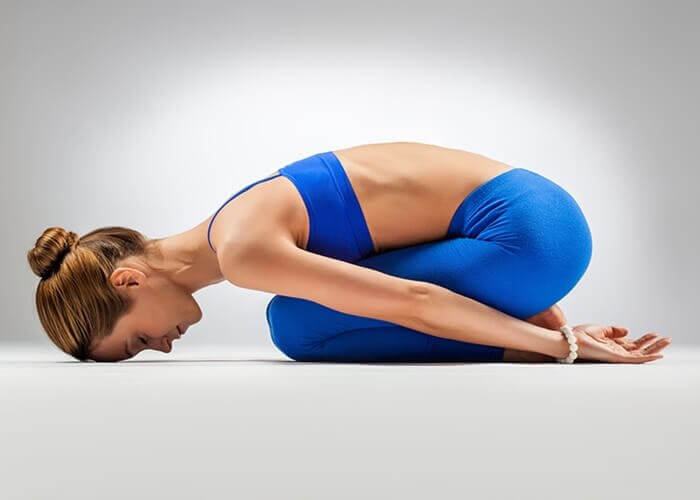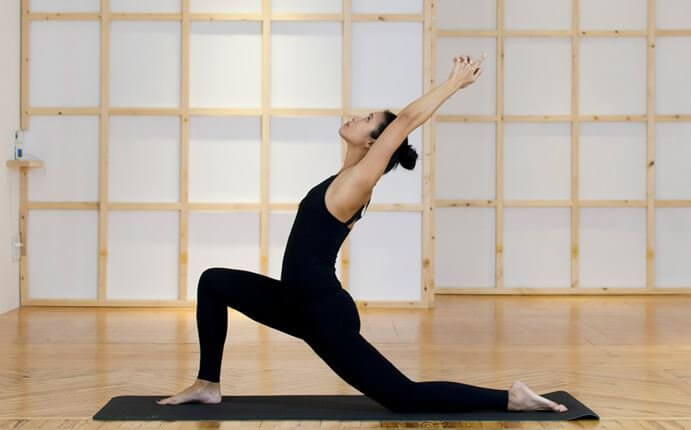Yoga for Back Pain


Reviewed and approved by Doctor Carlos Fabián Avila
Yoga for back pain is a great way to relax your muscles and fight the symptoms caused by stress. While there are several factors that influence back pain, stretching and breathing through yoga can help alleviate it.
Although many people prefer to rest when they experience muscle tension, practicing yoga has therapeutic effects that are more beneficial. In fact, when you do it on a regular basis it becomes an effective way to calm chronic or recurring pain.
Nevertheless, it’s important to know which yoga poses to choose, especially if you don’t have a lot of experience with this practice. Because of this, today we want to share a simple routine with you that will work this part of the body. Are you ready?
1-Child’s pose

What should you do?
- Kneel on the yoga mat with your glutes resting on your heels. Stretch forward and rest your head on the mat, touching it with your forehead.
- Keep your arms at your sides to relax the whole body.
- Hold this pose for 15 to 20 seconds while taking a deep breath.
Note: if your head doesn’t reach the mat or you feel uncomfortable, use a pillow for support.
Also read: Discover Three Yoga Practices to Manage Stress
2-Cat cow pose
The “bidalasana” or cat cow pose is a complete exercise that reduces tension in the back and neck. It improves your use of synovial fluid to keep your spine flexible and healthy.
What should you do?
- Start in child’s pose and raise yourself up onto your knees. Support your torso with straight arms and arch your spine upwards (like a cat).
- Keep your head down, as if you were trying to touch your stomach with your forehead. Be sure your knees and the tops of the feet remain flat on the mat.
- Next, straighten your back and let it relax for a few seconds (cow pose). Also raise your head and look forward.
- Alternate between these two positions, holding each for a few seconds with breathing exercises. For example, breathe in during the first pose, and exhale during the next.
3-Triangle pose
The triangle pose, known as “trikonasana,” helps alleviate back and neck pain. It also increases the flexibility of your hips and spine to help you avoid the risk of injury.
What should you do?
- Stand up with your feet a little wider than shoulder-width. Touch your left leg with your left hand.
- Stretch your right arm toward the ceiling, alongside your head.
- Try to keep your left leg straight and the right only slightly bent.
- Repeat this exercise on the opposite side.
4-Grasshopper pose
The “salabhasana” or grasshopper pose is a complete exercise that stretches and relaxes various muscle groups of the body. Because it stretches the spine, it promotes pain relief. It also works your abdomen and shoulders.
What should you do?
- Lie face down on a yoga mat.
- Raise your legs and chest so they don’t touch the ground.
- Keep your arms at your sides with your fingers pointing toward your toes.
- Hold this pose for 20 to 30 seconds, breathing normally.
5-Pigeon pose

What should you do?
- Support yourself on your knees and place one bent leg forward. Stretch the other leg backwards and place your hands on the mat at either side of the body.
- Stretch your hips toward the ground. To do this, move the heel of your bent leg and lift the knee. You should also tighten your glutes to keep from losing your balance.
- Contract your abdomen and arch your back. Finally, stretch your arms over your head with your palms pressed together.
Note: To reduce pressure on your hips, push your hands to the mat firmly.
As you can see, this yoga routine for back pain is very simple and doesn’t require much experience. You just need to find a quiet and comfortable place where you can give it all your concentration.
All cited sources were thoroughly reviewed by our team to ensure their quality, reliability, currency, and validity. The bibliography of this article was considered reliable and of academic or scientific accuracy.
- Yogaterapia. https://yogaterapia.es/actividades-semanales-2/que-es-yogaterapia/
- Chen, K. Y., Shaparin, N., & Gritsenko, K. (2017). Low back pain. In Pain Medicine: An Essential Review. https://doi.org/10.1007/978-3-319-43133-8_121
- Williams, K. A., Petronis, J., Smith, D., Goodrich, D., Wu, J., Ravi, N., … Steinberg, L. (2005). Effect of Iyengar yoga therapy for chronic low back pain. Pain. https://doi.org/10.1016/j.pain.2005.02.016
- Cramer, H., Lauche, R., Haller, H., & Dobos, G. (2013). A systematic review and meta-analysis of yoga for low back pain. Clinical Journal of Pain. https://doi.org/10.1097/AJP.0b013e31825e1492
- Groessl, E. J., Weingart, K. R., Aschbacher, K., Pada, L., & Baxi, S. (2008). Yoga for Veterans with Chronic Low-Back Pain. The Journal of Alternative and Complementary Medicine. https://doi.org/10.1089/acm.2008.0020
This text is provided for informational purposes only and does not replace consultation with a professional. If in doubt, consult your specialist.








